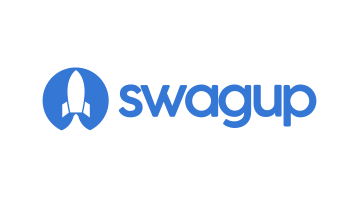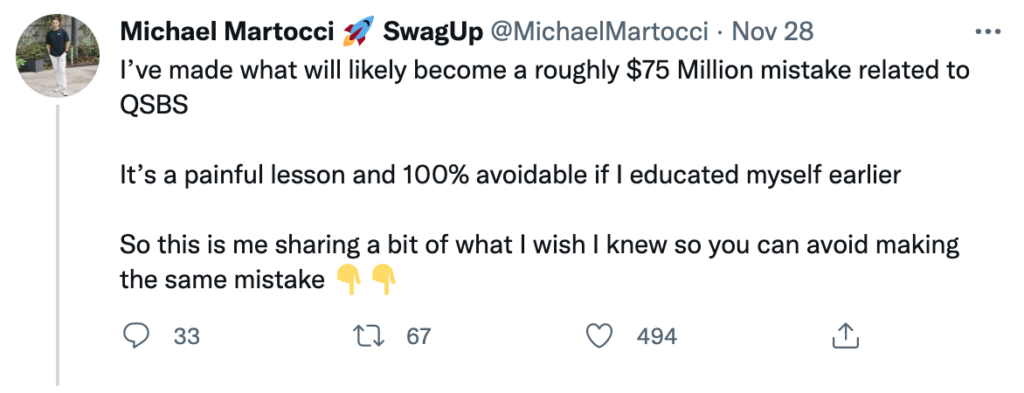Michael Martocci, founder and Chief Swag Officer of SwagUp, has wise words to share with fellow startup founders. In a recent Tweet, Martocci acknowledges a simple mistake that would end up costing him roughly $75 million in lost tax exemptions. He concedes this loss is not only a personal one, but a loss for early shareholders, as well.

What is SwagUp?
As one of the fastest growing startup companies in the $30 billion branded swag industry, SwagUp has served over 1500 customers and has brought in over 90 employees since it began operating in 2017. SwagUp’s business is dedicated “to taking the friction out of the corporate swag buying and distribution process.” Awarded one of Forbes’ 2021 30 Under 30 designation in Retail and eCommerce, Martocci shared his personal QSBS ignorance to help others from making the same costly mistake.
One of the Many QSBS Tripwires
A core component of QSBS eligibility is that the stock was obtained prior to the company exceeding $50M in Aggregate Gross Assets. What many people don’t realize however, is that in the case of a company converting from an LLC to a C-Corporation, the assets are re-measured at their fair value at the time of conversion.
In the case of SwagUp, the company converted from an LLC to a C-Corporation and the 409a (stock option valuation) at the time indicated that the total equity value exceeded $50M. This led to the company failing the Aggregate Gross Asset test at the time of conversion – and hence all shares issued by C-Corp to not qualify as QSBS.
How Can You Avoid this Tripwire?
In order to prevent your company from falling for the same QSBS tripwire, there are two important QSBS rules that come into play.
- Generally, QSBS must be acquired by a taxpayer at original issue from a corporation, therefore the Qualified Small Business Stock was first obtained upon the issuance of the C-Corporation shares post conversion from the initial LLC.
As per Section 1202(i)(1)(A),
“in the case where the taxpayer transfers property (other than money or stock) to a corporation in exchange for stock in such corporation – (A) such stock shall be treated as having been acquired by the taxpayer on the date of such exchange”
- Aggregate Gross Assets of the Corporation need to be below $50 million at all times before and immediately after the stock is issued. When property is contributed to a corporation (generally the case when an LLC converts to a C-Corporation,) for purposes of the Aggregate Gross Asset test, the property contributed is measured at its fair market value.
Section 1202(d)(2)(B) states, the following regarding the,
“Treatment of contributed property,” “the adjusted basis of any property contributed to the corporation…shall be determined as if the basis of the property contributed to the corporation…were equal to its fair market value as of the time of such contribution.”

Timing is everything in this case. Because Swagup converted business operations from an LLC to a C-Corporation when it did, the company’s shareholders were unable to benefit from stock that otherwise would likely have been QSBS. If only Swagup had made the move a little sooner, this mistake could have been avoided.
Martocci shared “one interesting” element that, when timed right, could have significantly increased the QSBS exclusion amount would have been to have converted from an LLC to C-Corp before the Company was worth $50M. The ultimate QSBS exemption amount is the greater of $10M or 10x each shareholder’s basis, so if a shareholder had $5M worth of equity at the time of the C-corp conversion they could have potentially benefited from tax-free gains up to $50M. He realized that timing is what impacted his eligibility for QSBS the most. With a 409a valuation over $50 million at the time of conversion, SwagUp had unfortunately missed the boat.
How can you avoid this same costly mistake that Swagup made? The simplest way is to proactively manage your company’s QSBS status and the CapGains platform can help you do just that.
Contact us today to learn how we can help.
This article does not constitute legal or tax advice. Please consult with your legal or tax advisor with respect to your particular circumstance.

